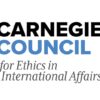Space Ethics
The world has entered a new space age: one in which what happens on Earth is intertwined with what happens in space. Already, Earth’s navigation and military information systems are dependent on low-Earth Orbit satellite networks. So, too, is our ability to predict the weather—including extreme events—and conduct research on climatic processes. Militaries around the world are preparing for the potential that the next major battlefield might be in space, while space diplomats seek to prevent its weaponization. And this is just the beginning. Strategies and technologies are being developed for mineral recovery from space for use on Earth. Plans are being put into place for bringing more people into space (and more organisms and biotechnology to support them) for exploration and potentially habitation. Increasingly, how well we do on Earth is tied to how well we do in space. The intertwining of Earth and space creates new possibilities and opportunities; but also new dependencies, vulnerabilities, and risks. There is an urgent need for research and collaboration to develop standards for a responsible push into space that promotes human flourishing, justice, peace, and sustainability. However, there is no field of space ethics to provide that guidance, and there are very few researchers working on ethical issues related to space. The aim of this initiative is to fill the space ethics gap in two interrelated ways. First, galvanize the field of space ethics by bringing together policy makers, scientists, and other key space actors with ethicists from adjacent fields, such as bioethics, AI ethics, military ethics, and environmental ethics. Second, develop robust ethics guidance on three crucial issues associated with humanity’s integration of Earth-based and space-based systems: space data collection and use; building space-related infrastructure; and bringing biology and biotechnology into space (and back).
Collaborators
John Basl is an associate professor of philosophy and affiliated faculty at Khoury College of Computer Science, Northeastern University, and leads AI and data ethics initiatives for Northeastern’s Ethics Institute and the College of Social Sciences and Humanities. His primary areas of research include moral philosophy and applied ethics, especially the ethics of emerging technologies such as AI and synthetic biology. He teaches courses in moral philosophy, ethics of technology, and ethics in scientific research, and is the author of The Death of the Ethic of Life. His work has been supported by NSF, NEH, and Facebook, and he has received the National Academy of Engineering Center for Engineering Ethics and Society’s award for an Exemplary Engineering Ethics Program. He currently leads a ten-week residential NSF-funded AI and Data Ethics Summer Training Program for graduate students. He received his PhD in philosophy from the University of Wisconsin-Madison in 2011.
Daniel Fogal is an Assistant Professor at the NYU Center for Bioethics and Affiliated Professor in the Department of Philosophy at NYU. Previously he was a Postdoctoral Research Fellow at Uppsala University in association with Matti Eklund’s Varieties of Normativity project. His research addresses a range of issues in (meta)ethics, epistemology, and philosophy of language, with a particular focus on the nature of reasons, rationality, autonomy, and informed consent. His published work includes papers in Mind, Noûs, Philosophical Review, Analysis, Philosophical Studies, and Ergo, and he teaches courses in bioethics, ethics of technology, and applied epistemology. He received his PhD from New York University in 2016.
Patrick Lin is the director of the Ethics + Emerging Sciences Group at Cal Poly, where he is a full philosophy professor. He is currently affiliated with Stanford Law School, Microsoft Research, Czech Academy of Sciences, World Economic Forum, For All Moonkind, Aurelia Institute, AIAA, and other leading organizations. Previous affiliations include the US National Space Council (UAG), US Naval Academy, Stanford Engineering, Dartmouth College, Center for a New American Security, UNIDIR, 100 Year Study on AI, and more. He is well published in technology ethics—including on frontier development (esp. outer space and the Arctic), AI, robotics, cybersecurity, bioengineering, nanotechnology, and security technologies—and is regularly invited to provide briefings on the subject to industry, media, and government. He received his PhD from the University of California, Santa Barbara. For more information, please see his biosketch at https://philosophy.calpoly.edu/faculty/patrick-lin or the Ethics + Emerging Sciences Group’s site at https://ethics.calpoly.edu/
Ronald Sandler is Professor of Philosophy and Director of the Ethics Institute at Northeastern University. His research spans environmental ethics, bioethics, and the ethics of emerging technologies. He is the author of Environmental Ethics: Theory in Practice, The Ethics of Species, Food Ethics, and Character and Environment, and is editor or co-editor of Environmental Virtue Ethics, Environmental Justice and Environmentalism, and Ethics and Emerging Technologies. Sandler’s research has been supported by NSF, NEH, and the Woodrow Wilson Center, among others, and he has received Northeastern’s Klein Award for research excellence in their field, as well as Northeastern’s Excellence in Teaching Award. Sandler has extensive experience leading multi-institution projects on the ethics of emerging technologies, supported by the Northeastern Ethics Institute administrative team. He earned his PhD in philosophy from the University of Wisconsin-Madison.
Zhanna L. Malekos Smith is a professor for the United Nations Institute for Training and Research, adjunct faculty for New York University’s Center for Global Affairs, and senior associate with the Aerospace Security Project and Strategic Technologies Program at the Center for Strategic and International Studies in Washington, DC. She is also a non-resident fellow at the UN Institute for Disarmament Research, the Carnegie Council for Ethics in International Affairs, and the Army Cyber Institute at the US Military Academy at West Point. Her expertise spans cybersecurity, space, emerging technologies, and international security. Previously, she was an assistant professor in the Systems Engineering Department at West Point and a professor of cyber warfare studies with the US Air War College. Zhanna has appeared on CNN, NBC, and BBC, and her commentary has appeared in POLITICO, Nature, Physics Today, and elsewhere. A former captain and attorney in the Air Force’s Judge Advocate General’s Corps, she received her commission from MIT’s ROTC program, where she was a cross-registered student and participated in the Undergraduate Research Opportunities Program. She holds a
BA in Russian and international relations from Wellesley College, an MA and associateship of King’s College from King’s College London, and a JD from the University of California, Davis. Zhanna has held fellowships with the Madeleine K. Albright Institute for Global Affairs, the Belfer Center’s Cyber Security Project at the Harvard Kennedy School, Duke University Law School, and Stanford University’s US-Russia Forum. She is also a volunteer consultant for Hostage US. For more information see https://www.csis.org/people/zhanna-l-malekos-smith
Ann C. (Anncy) Thresher is Assistant Professor of Philosophy and Religion and Public Policy and Urban Affairs at Northeastern University. She is an applied ethicist whose work focuses on emerging technologies with a particular focus on the environment and outer space. Much of her work is done in collaboration with scientists and policy-makers, where she writes for academic, political, and public audiences. Her current areas of focus include the use of genetic tools for conservation, the ethics of invasive species control, the environmental impact of extra-planetary expansion, public trust in science, and how to identify pseudo-science. She is also currently working on the ethical and environmental aspects of telescope siting and construction as a project lead at the Next Generation Event Horizon Telescope.
Events
Date/Time: April 2nd, 8:30am-9:30am ET
Location: New York/Virtual
Title: Unlocking Cooperation: Space Diplomacy
Description: The world has entered a new space age. This moment presents a myriad of novel ethical questions and governance challenges that require collaboration across sectors and the creation of new pathways for multilateral cooperation.
On April 2 from 8:30am-9:30am ET, Carnegie Council for Ethics in International Affairs and Northeastern University Ethics Institute invite you to attend a critical convening on the future of international space governance, diplomacy, security, and sustainability. The event will feature an expert panel discussion followed by an audience Q&A.
Link to website and registration




